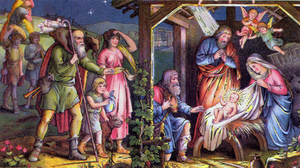Who is that Wonderful Baby?

Who is the baby that was born in Bethlehem today?
Who is the baby whose birthplace was declared by a wonderful star?
Who is the baby whose birth was celebrated by heaven and earth?
Who is the baby whose birth troubled Jerusalem and its king, while giving joy to the simple people?
Who is the baby whom the magi worshiped, and to whom they offered their gifts?
He is the Christ who was born from the Father before all ages – His Divinity; born in the fullness of time from the Virgin Mary – His humanity. Christ is the fulfillment of the prophecies; the hearts of the believers were attached to Him, waiting for salvation, expecting the coming of Christ the Savior, the Son of God and the Son of Man; Christ the descendant of David by the flesh; Christ the eternal king.
Continue reading…Let Us Start a New Year
Let us start a New Year. Let us have a new beginning. Let us finish this year with repentance and thanksgiving, and begin the New Year with joy and hope.
We don’t know the hidden secrets of the future, but we know who controls the future. We trust His words: “Let not your heart be troubled, neither let it be afraid.” (Jn. 14:27) “Do not worry about tomorrow” (Matt. 6:34) “do not be afraid.” (Matt. 14:27) Thus, we should not be afraid from the future.
So, what is the meaning of a New Year for us?
Continue reading…Praise God in All His Saints
Praising is the main work or act of the angels and all the heavenly creatures. Isaiah the prophet beheld the Seraphim with six wings praising continuously without ceasing saying, “Holy, holy, holy is the Lord of Hosts; the whole earth is full of His glory!” (Isa 6:1-3) St. John also saw, heard and testified in his revelation saying, “Then I looked, and I heard the voice of many angels around the throne, the living creatures, and the elders; and the number of them was ten thousand times ten thousand, and thousands of thousands saying with a loud voice: ‘Worthy is the Lamb who was slain to receive power and riches and wisdom, and strength and honor and glory and blessing!’” (Rev. 5:11, 12) And, “the four living creatures, each having six wings, were full of eyes around and within. And they do not rest day or night saying, “Holy, holy, holy, Lord God Almighty, who was and is and is to come.” (Rev. 4:8)
Continue reading…Psalmody - The Prayer of Praise
Introduction
The Service of the Psalmody or simply Psalmody, also understood as psalm singing, is a unique collection of Scripture passages from the Holy Bible, which are chanted. In Coptic Orthodox Tradition, the hymns of the Psalmody have been collected together in a book known as the Psalmodia. The Scripture passages, which make up the Psalmody, are taken from a selection of the Psalms and other passages, primarily from the Old Testament, which contain prayers of praise known as canticles. These Psalms and canticles have been augmented by meditations and summaries and have been set to special tunes and rhythms some of which are chanted quickly and others are extended to emphasize the prayer of praise and meditation. We understand from history and tradition that our ancient Egyptian forefathers in their ritualistic and religious practices used these tunes.
Thus, praying the Psalmody is not only a prayer of praise, rich in Holy Scripture and meditations, it also provides a unique window into the religious experience of ancient Egypt, as the same unique music remains part of the worshipper’s prayer of praise to God today as it did in millenniums past. Scholars maintain that, “… the musical tradition has continued unbroken from its beginnings to the present day [and consider] it a living link between the past and the present.” They believe that, “… Coptic music must be sung in the Coptic language if it is to express the spirituality of the ancient church … [and not] lose their genius and character, especially where extensive vocalize is concerned.” (The Coptic Encyclopedia – Volume 8, pages 1730 and 1731 respectively)
Continue reading…Why We Don't Give Thanks
H.H. Pope Shenouda III
One of the excuses for not giving thanks is the fact that we do not know what is good for us. Truly, it is only God -with His vast wisdom- who knows what is good for us. But our human wisdom is limited and cannot see into the future.
For example, who would believe that selling the upright Joseph as a slave, and unjustly throwing him into the prison will be for his benefit and the benefit of his brothers and father, Egypt and the surrounding countries? Perhaps the righteous Joseph did not give thanks when he was sold as a slave, and when he was unjustly accused and thrown into prison but, undoubtedly, he frequently gave thanks and knew that “...God meant it for good .... Save many people alive” (Gen. 50: 20)
We do not know what the future holds but we know one thing; that the future is in the hands of God. We thank God because He keeps the whole future in His hands to manage with His good will and give good things to His children. We therefore, have confidence in all that comes from God's hand filled with love. By faith, we see the hand of God in all the incidents we face. And since we are comforted with the work of God, we should rejoice and give thanks.
Continue reading…